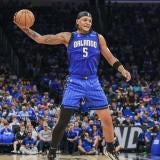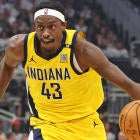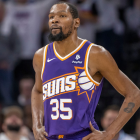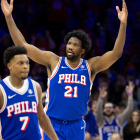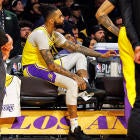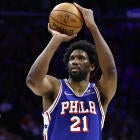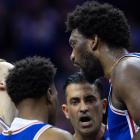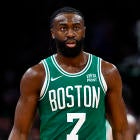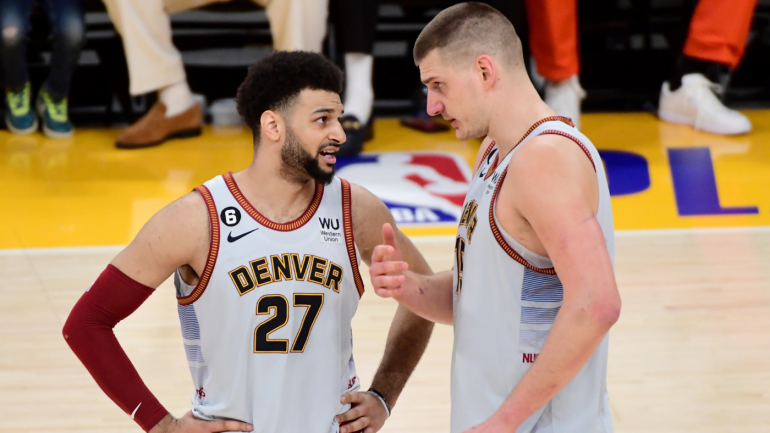
The 2023 Denver Nuggets defied just about every roster-building convention to reach the NBA Finals. Their best player was so unremarkable as an amateur prospect that the Nuggets drafted him during a Taco Bell commercial in the second round. Nikola Jokic is the only player in their rotation to have ever reached an All-Star Game. The closest they ever came to adding a veteran star was a brief meeting with Dwyane Wade all the way back in 2016. In 2018, LeBron James didn't even grant them a meeting.
Now the Nuggets are in the NBA Finals for the first time in franchise history. Facing the eighth-seeded Miami Heat, they're heavily favored to win their first title, and with a relatively young core, they figure to be in the championship mix for years to come. But how did they get here? How did the Nuggets build a roster as unconventional as it is dominant?
Let's take a trip down memory lane and look back on the moves that made the Nuggets Western Conference champions.
A fateful trip to Portland
Nothing about Nikola Jokic's 2013-14 Adriatic League stats screamed "future NBA MVP." In his second season playing for KK Mega Basket, Jokic couldn't reach 12 points or four assists per game. But he scored an invite to the 2014 Nike Hoops Summit in Portland, and he made the most of it. "He's never been (athletic)," Clint Capela, another attendee of the 2014 Hoops Summit, joked to the Denver Post's Mike Singer in 2019. "From playing in Europe, he was kind of doing everything already. I remember he hit a couple 3s in a row, a great post-up player."
The Nuggets were sold. The rest of the league wasn't. So with 10 days before the draft, Jokic's agent decided to pull him out of the 2014 NBA Draft. The Nuggets convinced him to change his mind. The rest is history.
Had Jokic held firm, he would've been drafted a whole lot higher in 2015. In his final season in Europe, he averaged over 19 points and 11 assists against Serbian opponents. Only two other European players were drafted in the first round in 2015. One of them was Kristaps Porzingis, a player whose stardom was apparent well in advance. The other was fellow Serbian big Nikola Milutinov, whose numbers paled in comparison to Jokic's. By the time the NBA realized how special Jokic could be, it was too late. He joined the Nuggets in 2015 and quickly became a starter. Now, he's the greatest player in franchise history.
Masai Ujiri's final gift
The New York Knicks very nearly traded for Kyle Lowry in 2013. They didn't, according to the New York Daily News' Frank Isola, because Knicks owner James Dolan did not want to get hoodwinked by Raptors executive Masai Ujiri again. Earlier that offseason, Ujiri's Raptors offloaded Andrea Bargnani's bad contract onto the Knicks and picked up a first-round pick for his troubles. Two years before that, Ujiri, then running the Nuggets, stripped the Knicks of youngsters Danilo Gallinari, Wilson Chandler and Raymond Felton in the fateful Carmelo Anthony trade.
What Dolan didn't know was that worst was yet to come. A minor detail of that Anthony blockbuster was that it gave Denver the right to swap first-round picks with New York in the 2016 NBA Draft. On paper, this upgrade appeared minimal. Denver landed at No. 9 on lottery night. New York, whose pick was headed to Toronto as part of the Bargnani trade, finished at No. 7. The Nuggets only gained two slots. But at No. 7, the Nuggets selected a point guard from Kentucky named Jamal Murray.
Murray's slide was surprising. He was almost universally regarded as a top-five prospect, and on the morning of the 2016 Draft, CBS Sports mocked Murray to Minnesota at No. 5. Minnesota ultimately settled on another point guard, Kris Dunn, whom they traded for Jimmy Butler a year later. The New Orleans Pelicans at No. 6 were a prime candidate to select Murray, especially after years of struggling offensively in part because they were playing Jrue Holiday out of position at point guard. Yet they also passed on Murray, instead selecting Buddy Hield, whom they also traded less than a year later. In fact, of the six players drafted ahead of Murray, only Jaylen Brown remains with his original team.
The Nuggets weren't a slam dunk for Murray, though. Only one year earlier, they'd spent the No. 7 overall pick on another point guard, Emmanuel Mudiay. Yet Denver wouldn't be deterred. The Nuggets took the best player available. It's a philosophy the Nuggets probably should've continued to enforce. One year later, they held the No. 13 overall pick in the 2017 NBA Draft. They used that pick on Donovan Mitchell, but quickly traded him to the Utah Jazz. The thought process made sense. Reports would later indicate that Denver planned to target OG Anunoby by moving down. Anunoby would have been a perfect fit, but was picked by Utah's No. 24 slot came up. Ironically, it was Ujiri's Raptors that grabbed Anunoby. He can't make life too easy on his old team, after all. He'd already given them enough.
Had the Nuggets missed out on that pick swap, they may not have landed Murray at all. Sitting behind them at No. 8 were the Phoenix Suns, who had just hit a home run drafting another Kentucky guard a year earlier named Devin Booker. Toronto easily could have selected Murray at No. 7 were it not for the swap. While they had Lowry and DeMar DeRozan in place, Murray, a Canadian native, was by far the best player on the board. As Dolan knows, Ujiri rarely makes mistakes. The final asset he left the Nuggets turned out to be the point guard that would one day take them to the Finals.
High risk, higher reward
Michael Porter Jr. was the No. 1 ranked prospect in his high school class. It wasn't even really close. He drew comparisons to Kevin Durant as a teenager, and he had no problem reinforcing his talent in the buildup to the 2018 NBA Draft. "I'm the best player in the NBA Draft," Porter said after a workout with the Mavericks. Dallas didn't take him. Several other teams passed as well.
Talent wasn't the concern. Health was. Porter missed most of his lone season at Missouri due to a lower back injury that would require surgery. No body part scares NBA teams more than the back. It can be so tricky that Steve Kerr missed roughly half of the 2015-16 season after undergoing back surgery... and he's a coach.
By 2018, Denver was uniquely situated. The Nuggets had just come one win short of the playoffs. They knew they were headed somewhere special and would probably be there for quite some time. As they won 54 games the next season, they were clearly right. They therefore didn't have any major needs to address on draft night. So they allowed themselves to draft for luxury.
Other teams were more than justified in passing on Porter. He's missed almost two full seasons due to back injuries, and the 2018 draft was absolutely loaded. As talented as Porter was, it would be hard to justify picking the injured version of him over Luka Doncic, Trae Young or Shai Gilgeous-Alexander. The teams that picked them needed franchise players. Denver already had two of them. So they took a gamble.
Despite those missed seasons, it has more than paid off. Porter is an absolutely perfect offensive fit with Jokic and Murray. Denver never has to run plays for him. He's perfectly comfortable coming off of the flare and pindown screens teams typically set for shooters half a foot shorter than he is. He's a wonderful gap filler offensively, always in the right place at the right time and capable of scaling up his offensive usage when the Nuggets need him to. Denver didn't just find a third star in 2018. They found a star willing and able to be their third. That's a testament to both Porter and the culture the Nuggets have built around him. They wound up becoming the perfect pairing of player and team.
Right players, wrong team
We've covered the three best Nuggets. Their No. 4, both positionally and in terms of hierarchy, was supposed to be Jerami Grant. Denver swiped him in Oklahoma City's 2019 fire sale, and he went on to do an admirable job of defending LeBron James in the Western Conference finals in 2020. He became an unrestricted free agent that offseason, and Denver was fully prepared to make the highest bid. Yet Grant, seeking more shots and ball-handling opportunities, chose the Pistons even after the Nuggets made it clear that they would match the offer.
It turned out to be a blessing in disguise. Had the Nuggets retained Grant, they almost certainly wouldn't have traded for Aaron Gordon. His career was moving in the opposite direction of Grant's. After spending his formative years putting up numbers on disappointing Orlando Magic teams, Gordon was ready to sacrifice for a winning environment. Denver gave up quite a bit to get him: starting shooting guard Gary Harris, promising youngster R.J. Hampton and a first-round pick. It was well worth it. Gordon joined the Nuggets and immediately turned into one of the NBA's best cutters. He's a better defender than Grant has ever been, and he's comfortable never touching the ball if that's what it takes for Denver to win. In terms of raw skill set, the two are similar. But one player was ready to do what it took to win. The other had different priorities.
Grant wasn't the only relevant figure from that 2020 series against the Lakers. Kentavious Caldwell-Pope made 44% of his 3-pointers in that series while defending Murray for lengthy stretches. The Lakers dumped him unceremoniously onto the Washington Wizards in their ill-fated Russell Westbrook blockbuster. There, he would cross paths with a former Nugget that arrived under much better circumstances: new head coach Wes Unseld Jr. came from Michael Malone's staff in Denver.
A year later, when Unseld's Wizards needed a new point guard, they turned to Denver's bench. He knew Monte Morris from their time together with the Nuggets and felt he'd be the perfect fit alongside Bradley Beal. This suited the Nuggets just fine. Not only did they manage to save money in the deal by including Will Barton, but they picked up a starting-caliber shooting guard for two reserves. Caldwell-Pope was yet another opportunistic addition ready to make the most of his environment after struggling in the wrong environment.
Bruce Brown is a quintessential Nugget: an excellent off-ball mover and screener, comfortable on both ends of the pick-and-roll, an underrated defender and a crafty enough driver to serve as an occasional backup point guard. But, at least before this season, the numbers suggested that he couldn't shoot. Brooklyn needed to clear its roster of non-shooters to prepare for the return of Ben Simmons, so the Nets didn't re-sign him. Denver jumped in and nabbed him for the tax-payer mid-level exception.
Good front offices identify players that are already succeeding that might fit onto their roster. Great front offices identify players whose environments are preventing them from reaching their ceiling and land them at a premium. The Nuggets have been doing that for years. Their top three may have been home-grown, but the rest of the rotation was the result of great scouting and even better timing.
Betting on their guys
Getting the right players is only half of the battle. A good team only becomes a champion by maximizing those players. That was never a given for Denver's core. When Jokic arrived, for instance, he wasn't even the most heralded European center on the roster. One year earlier, first-round pick Jusuf Nurkic had seemingly claimed the long-term center slot for himself. An injury to Nurkic gave Jokic the room he needed to thrive as a rookie, but Denver initially tried to start the two of them together during the 2016-17 season.
"This isn't working," Jokic told Malone in November of 2017, according to Sports Illustrated's Lee Jenkins. "I want to come off the bench." On most teams, that would've been it. Jokic would've been lauded by his coaching staff and his teammates for his selflessness... and then he would've settled into a long-term role as a bench player. But the Nuggets knew they had something special in Jokic. They were so certain of it that they traded Nurkic to Portland at the 2018 trade deadline and handed their budding Serbian superstar the keys.
That one trade defined the early portion of Jokic's career. Murray and Porter's careers have been defined by the trades Denver didn't make. The traditional path taken by a young contender of Denver's ilk typically involves developing a core only to break it up for the sake of a veteran star. Porter's name was thrown around for just about every star that hit the market. Jrue Holiday, Bradley Beal, even Kevin Durant came up in the Porter parlor game.
When Murray tore his ACL in 2021, he initially feared that he would wind up being the young Nugget that got dealt for a veteran. Malone assured him that wouldn't be the case. Plenty of teams would have cut their losses at that point. The Minnesota Timberwolves, for example, traded Zach LaVine for Butler as he was recovering from the same torn ACL that kept Murray out. But the Nuggets never rushed. They didn't trade Murray. They let him miss two full postseasons. They believed in the players they had and developed them properly.
That has been Denver's approach throughout this entire era. Almost every young Nugget gets a second contract. Harris, Barton, Morris, even players from the previous generation like Kenneth Faried all got at least one sizable extension in Denver. The culture the Nuggets have built has allowed players to feel comfortable in Denver. The Nuggets haven't just landed the proper players, they've done everything in their power to position them for success. Now that's paying off with the franchise's first trip to the Finals.










